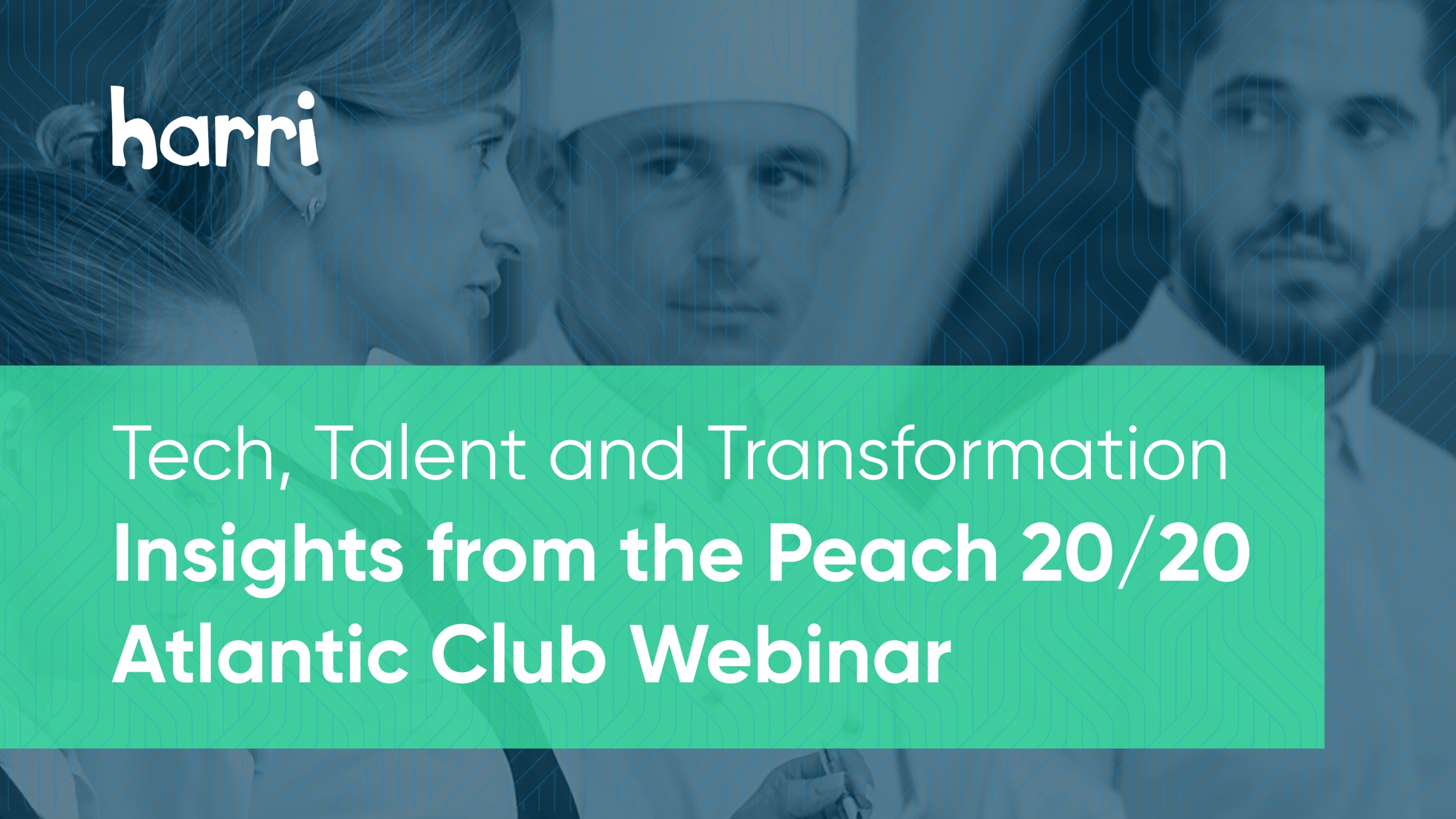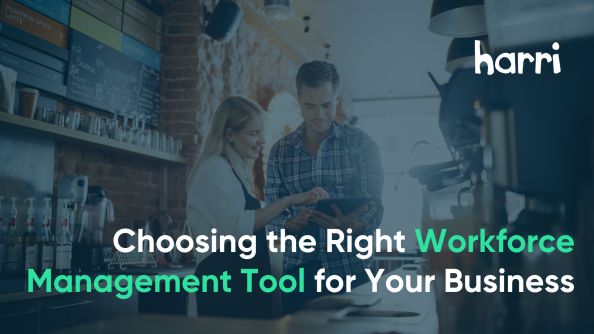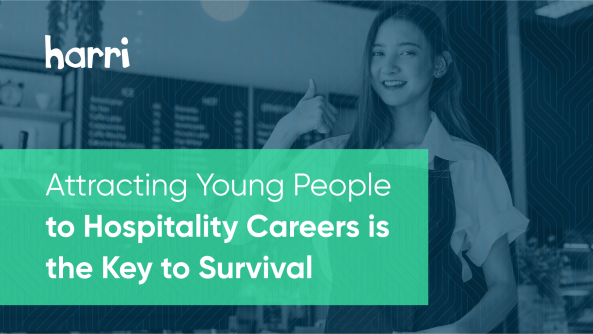Tech, Talent and Transformation – Insights from the Peach 20/20 Atlantic Club Webinar

- By Harri Insider Team | April 7, 2022
The latest Atlantic Club webinar from networking group Peach 20/20 saw a panel of industry insiders share their views on two of the most pressing issues facing hospitality today: talent retention and customer engagement.
The panel, chaired by Peach2020 founder Peter Martin, included Harri CEO and founder Luke Fryer, Harri commercial director Pete Willis, The Restaurant Group leisure and concessions managing director Jon Knight, and author Meredith Sandland. The panellists explored the importance of an integrated tech stack encompassing Customer Experience (CX) and Employee Experience (EX) technology solutions.
Read on for the key takeaways of the discussion around Employment Experience…
Communication continues to be key
Using technology to communicate effectively with employees became more important than ever during the pandemic, when restaurants were forced to send their staff home. Harri’s Luke Fryer said engagement through “true communication” with “capable messaging” remains one of the main things hospitality employees are looking for today.
He added that the pandemic taught operators that “a fundamentally different approach” to communication with frontline employees was needed.
“What we learnt there is if communications to frontline teams are not wrapped around getting a schedule or a rota, or seeing when they have been paid, those messages don’t reach them. We needed to rethink how to get those messages through.”
The Restaurant Group’s Jon Knight agreed, saying it was the company’s ability to use tech to keep in near daily contact with teams during the lockdowns that meant it was able to retain key staff when the restaurants reopened.
Striking the work/life balance
Technology can also help with the second major item on employees’ wishlists: a good work/life balance. Luke explained: “The key thing people are looking for is predictability and certainty of when they are working and how many hours they are getting. Technology has a really important role to play in making sure we are consistently delivering the pattern of hours and number of hours people expect.”
He revealed the impact on staff retention of a “sudden or significant decline” in the number of hours offered to an employee: 65% of employees leave in the first six months of employment as a direct result of scheduling dissatisfaction.
“Having technology monitor the pattern and number of hours, and alert our scheduling managers to unnecessary or significant shifts is a very, very important part of technology’s role in delivering those consistent working patterns”
Jon said The Restaurant Group puts a lot of emphasis on getting to know individual employees’ personal situations so they can make schedules that fit around people’s lives. He said: “We’ve been very good in the past at just creating a schedule that fits the restaurant – we’ve got to start learning to do a schedule that fits the team, and the team will be in the best place they possibly can be to give the guests the great service that they expect.”
Reducing the daily grind
The third major way in which technology can help improve employees’ working lives is specifically for managers – to help them reduce the “manager grind”. Luke suggested that companies “take a little bit of the accountant or lawyer approach” and break each manager’s day down into six- or 10-minute increments so they can see exactly how their time is spent.
“It’s really, really valuable to understand where they are spending their time on such a granular basis. The results can be quite startling: what you will find is that somewhere between 45-60% of a manager’s time is spent churning through administrative or workflow tasks that really can be assisted by automation,” he said.
Building a schedule, managing timesheets and allocating tasks to team members are the main areas of “manager grind”, according to Luke. However, on average 20-22% of managers’ time is also spent on hiring activities such as posting jobs, screening candidates, conducting interviews and onboarding.
Luke said: “If we can bring technology to bear and let our managers know that their experience is so important to us that we are putting automation in place, it really speaks to their ability to get on with the parts of the job they love the most – serving customers and training and developing their team.
“At a time when hospitality recruitment generally has suffered some damage, we want to be showing our managers we understand where they’re spinning their wheels, where they’ve got grind. Putting technology in place to solve that really energises a managerial team.”
Employees want more tech
With younger, tech-reliant workers increasingly taking up hospitality jobs, the need for operators to adopt more technology in their businesses is paramount. Pete Willis illustrated this point by revealing that Harri’s latest research in conjunction with CGA found that 88% of UK hospitality employees believe their employers needed to up the stakes with their technology stack.
“Young people are becoming a lot more demanding – during Covid they’ve had a lot more flexibility”
“What we’re looking for is how operators can actually engage them – whether they’re employees or candidates – through consumerising workplace technology. We need to make hospitality an incredibly vibrant and happy place to work, and in order to do that you’ve got to give your employees the right conditions.”
Meredith Sandland, author of the book “Delivering the Digital Restaurant” agreed that utilising technology in all areas of the employee experience is vital.
“Employees are consumers – these aren’t people who show up at your restaurant and work and then go home and go to bed and don’t do anything else. So they are very well versed in all of these digital things in other aspects of their lives, and if they get to your restaurant and it’s not digital, they’re going to be totally mystified because the rest of their life is,” she said.
Looking to the future
So what’s going to be coming down the line next for hospitality tech? Luke predicted that AI will be the next big growth area, both “working in the foreground or the background”.
He suggested businesses will be able to use AI for such applications as “predicting which employees may be leaving us, which candidates will be better for us to hire, and to better predict sales so we can better rely on labour”. “You are going to see that start to happen quite quickly over the next year or two – AI that’s actually impactful,” added Luke.
He also said we can expect advancements to the ways in which managers can perform tasks on the move, as well as a “harmonisation of tools within the flow of work”.
Luke explained: “More and more of our managers’ and employees’ daily tasks will be integrated into a mobile device so things can be done on the go.
“The focus will be on making sure many more tasks can be conducted within existing workflows, so employees can get more done working in less places.”
How Harri can help
Find out how Harri can support your employee experience by booking a demo now.





















